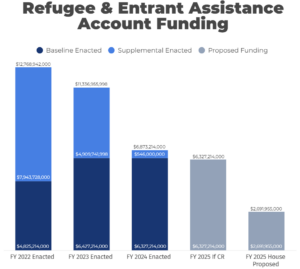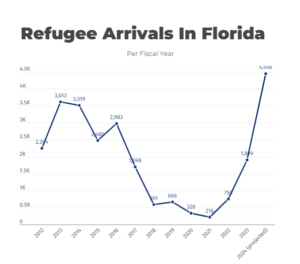Florida has a long tradition of welcoming refugees and others fleeing violence and persecution, and is home to a growing number of newcomers – including many fleeing Cuba and Haiti – who are eligible to receive certain federally-funded services for newcomers that promote economic self-sufficiency and community flourishing.
The Office of Refugee Resettlement (ORR): The Office of Refugee Resettlement directly funds local communities’ efforts to provide core integration services to newcomer populations, including refugees, Cuban and Haitian entrants, Afghan and Ukrainian humanitarian parolees, unaccompanied children, Special Immigrant Visa (SIV) holders, and others. Through programs like Transitional and Medical Services (TAMS) and Refugee Support Services (RSS), ORR helps Florida by supporting job training, English language classes, support for schools integrating new students, mental health care, and care for the elderly. ORR programs pay for themselves – a February 2024 report from the U.S. Department of Health and Human Services found refugees and asylees had a net fiscal benefit of $124 billion when taking into account the cost of ORR services.
Refugee Support Services includes the Refugee School Impact Program, which provides resources to local schools to help them facilitate successful integration – improving outcomes for all children in the community.
How ORR serves Florida communities: In Fiscal Year 2023, Florida welcomed 112,225 Cubans and 52,741 Haitians, in addition to 1,899 refugees resettled through the U.S Refugee Admissions Program (USRAP). The growing number of Cuban and Haitian entrants has contributed to Florida’s status as the largest recipient of federal ORR dollars. Florida received $990.6 million in resettlement resources to support communities welcoming newcomers in Fiscal Year 2023 and $1.2 billion in Fiscal Year 2024.
A Haitian woman in Miami experienced depression and insomnia related to the trauma of witnessing a homicide when she was a student in Port-au-Prince. Through ORR-funded services, she is receiving case management, has access to mental health care, and has joined a therapy group.
With ORR-funded case management, a high school student with an intellectual disability who recently arrived from Cuba with her mother received support navigating the U.S. medical system and enrolling in an educational program that meets her needs.
Without action by Congress, ORR programs face massive cuts. Funding for key ORR programs faces tremendous precarity in Congress, and support for Florida communities hangs in the balance. The House Labor Health and Human Services budget proposal for FY 2025 contemplates a more than 90% cut to the above ORR services compared to FY 2023 levels. In recent years, a significant portion of the annual funding for ORR has come from supplemental funding. That means that even a continuing resolution (CR) that maintains base emergency funding levels could lead to a 75% cut to ORR compared to levels in FY 2023.
ORR Formula Grants to Florida
| Program Areas | FY 2023 | FY 2024 | FY 2025 House Proposal |
| Refugee Support Services | $400.1 million | $271.9 million | $40.6 million |
| Transitional and Medical Services | $590.5 million | $929.8 million | $676.3 million |
| Florida Resettlement Subtotal (RSS & TAMS) | $990.6 million | $1.2 billion | $716.9 million |
FY 2024 totals are based on the Administration for Children and Families’ projections for a CR maintaining the FY 2023 allocations for the REA account. RSS and TAMS funding remained unchanged from FY 2023 to FY 2024; RSS received $307.2 million and TAMS received $564 million in both fiscal years.
Top Nationalities of Florida USRAP arrivals, FY 2024 to date:
- Venezuela
- Syria
- Nicaragua
- Afghanistan
- Democratic Republic of Congo
- Guatemala
The number of ORR-eligible individuals continues to rise as funding stalls :
:
In FY 2025, ORR projects it will serve a significantly increased number of individuals, including 436,000 new arrivals and 1.9 million carryover beneficiaries from prior years. Multiple factors contribute to the projected increase, including ongoing efforts to return the number of refugee arrivals to a level more consistent with the historical average, the continued arrival of Ukrainians through the Uniting for Ukraine program, and a significant rise in the number of Cuban and Haitian entrants in need of services.
As the number of people needing services has continued to grow, Congress has failed to commensurately increase resources for ORR.
You can view this document as a pdf here.

